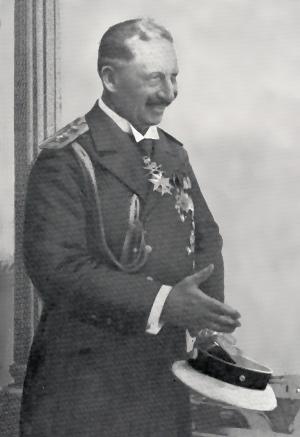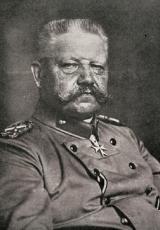Guillaume II

Source: l'album de la guerre (the war album) 1914-1919. © L'illustration
Wilhelm II, the son of Emperor Frederick and Empress Victoria, the grandson of Wilhelm I of Hohenzollern on his father's side and Queen Victoria of England on his mother's, was born in Potsdam on the 27th January 1859. After studying at the secondary school in Kassel, he took a two year course at the university of Bonn and began his military training in the Guards. He was made Lieutenant in the 1st regiment of Foot Guards in 1877 and Captain in 1880, Commander of the Guard's Hussars in 1881 and then of the 1st battalion of the 1st regiment of Foot Guards in 1883. He was promoted to Colonel, in charge of the hussars, in 1885 and appointed General in 1888. In the meantime, in 1881 he married Princess Augusta-Victoria, the daughter of Frederick Augustus of Schleswig-Holstein. In May 1844, he travelled to Russia to consolidate the alliance of the three Emperors (Germany, Austria and Hungary) in accordance with Chancellor Bismarck's orders. Crowned king of Prussia and Emperor of Germany on the 15th June 1888, following the three month reign of Frederick III, it was his intention to begin to exercise real political power. However, his involvement fluctuated wildly, depending on the state of his mental health.
His differences of opinion with Bismarck, most notably regarding social matters, relations with Russia and colonial policies became more frequent and, in 1890, the latter resigned. To replace him, Wilhelm II appointed Leo von Caprivi who would be succeeded in 1894 by Prince Chlodwig zu Hohenlohe-Schillingsfürst, in 1900 by Prince Bernhard von Bülow and in 1909 by Theobald von Bethmann-Hollweg. Responsible for the development of the military power and wealth of the German Empire, he embarked on a policy of commercial, colonial and maritime expansion. Germany witnessed great rapid economic development, gradually becoming the top industrial power in Europe. The impact on a social level was manifold but tensions were no less frequent. The social democrats continued to gain ground, securing the greatest representation in the Reichstag in 1912. On a domestic level, however, the country was also up against its minority groups: the Polish in Posen, the Danish in Schleswig and those from the Alsace and Lorraine region who refused to accept the policy of Germanisation. In Europe, Germany's growth as well as its foreign policy caused worry. Competition to seek out commercial opportunities, interventions in the Near East and the Balkan countries were just some of the subjects of disagreement, especially as the Emperor kept changing his position, first siding with one and then another of the other four great European powers (Great Britain, France, Austro-Hungary and Russia). He did not renew the mutual assistance treaty with Russia in 1890, concentrating his efforts on strengthening the Triple Alliance (Triplice) between Germany, Austria and Italy, which was renewed in 1892, 1902 and 1912, but not without a few attempts at bridge-building with Great Britain and France (who signed the treaty of Entente cordiale between themselves in 1904) and with Russia herself. However, Anglo-German relations continued to deteriorate. The defensive with Russia (the 1905 treaty of Björkö) was a failure. Similarly, the attempt at reconciliation with France following the Agadir affair (1911) did not succeed. Germany became increasingly diplomatically isolated. Wilhelm II stepped up the reinforcement of his army and navy.
As Commander in Chief of the armies during the conflict that broke out in 1914, he retained the power to make appointments to the highest positions, as well as his role of coordination and arbitration between politicians and the military. However, he had to hand over the management of operations to Hindenburg and Ludendorff, who had become very popular following the success at Tannenberg and the Mazures lakes in August and September 1914 and who were appointed in charge of the High Command in the summer of 1916. Confronted with German defeat and the revolutionary troubles of November 1918, the emperor abdicated on the 9th. He took refuge in the Netherlands, who refused the extradition request from the Allies seeking to apply sanctions against him as prescribed by the treaty of Versailles. He then devoted himself to writing and in 1922 and 1927 published his memoirs: Ereignisse und Gestalten, 1878-1918 and Aus meinem Leben, 1859-1888. He died in Doorn, in 1941.


